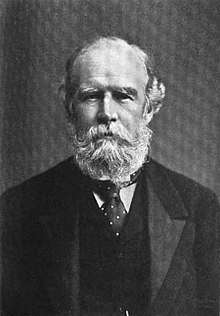British Empire League
The British Empire League existed from 1895 to 1955; its purpose was to secure permanent unity for the British Empire.
 Founder Lord Avebury | |
| Predecessor | Imperial Federation League |
|---|---|
| Founded | 1895 |
| Founder | Lord Avebury |
| Extinction | 1955 |
| Purpose | Unity for the British Empire |
| Headquarters | London, England, U.K. |
Origin
The British Empire League was a society founded by Lord Avebury (1834-1913), Lord Roberts (1832-1914) and Lord Strathcona (1820-1914) in London in 1895 with the aim of securing permanent unity for the British Empire.[1][2] It was successor to the former Imperial Federation League, which had broken up in 1893.[3]
Presidents of the League included: Lord Derby (1841-1908), Lord Sydenham (1848-1933), and the Duke of Devonshire (1833-1908); Vice-Presidents included: Bonar Law (1858-1923), Earl Grey (1851-1917), and Arthur Balfour (1848-1930).[3]
In 1947, the League merged with the Commonwealth Industries Association, retaining its name until 1955.[1]
Purpose
The League helped to mobilise troops during the Second Boer War and World War I; at Imperial Conferences between 1897 and 1911, it called, among other things, for the introduction of an imperial penny post; later it called for preferential tariffs, putting forward a strong case at the 1932 British Empire Economic Conference for the protection of the British film industry.[1]
The League was active in the British dominions of Australia and Canada in the early part of the twentieth century.[3] Francis Bertie Boyce (1844-1931) was the first president of the British Empire League in Australia, in 1901 (and also in 1909-11);[4] George T. Denison (1839-1925) was the first president of the League in Canada.[5]
The League's focus on the celebration of the birthday of Queen Victoria - 24 May - as a patriotic holiday[6] was, in Australia, not only an observance of the holiday in schools, but also a wider opportunity to demonstrate loyalty to Britain; Empire Day was officially adopted by the Reid Government in 1905 and observed for more than fifty years.[7] The League sponsored a monthly Australian publication, United Australia, which featured on its cover Britannia and the motto "One people one destiny".[8]
References
- Barberis, Peter (2005). Encyclopedia of British and Irish Political Organizations: Parties, Groups and Movements of the Twentieth Century. London: Continuum International Publishing Group. p. 94. ISBN 0826458149.
- Cook, Chris (2014). Sources in British Political History 1900-1951: Volume I: A Guide to the Archives of Selected Organisations and Societies. London: Palgrave Macmillan. p. 107. ISBN 1349155659.
- Stephen, Daniel (2013). The Empire of Progress: West Africans, Indians, and Britons at the British Empire Exhibition, 1924-25. London: Palgrave Macmillan. p. 26. ISBN 1137325119.
- "Boyce, Francis Bertie (1844–1931)". Australian Dictionary of Biography. 2017. Retrieved 2 October 2017.
- Gagan, David Paul (2013). The Denison family of Toronto 1792-1925. Toronto: University of Toronto Press. p. n.p. ISBN 0802032974.
- "Empire? What empire?". The Daily Telegraph. 2004. Retrieved 2 October 2017.
- Griffiths, John (2014). Imperial Culture in Antipodean Cities, 1880-1939 (Britain and the World). Toronto: Palgrave Macmillan. p. 154. ISBN 1137385723.
- "United Australia". Internet Archive. 2017. Retrieved 2 October 2017.